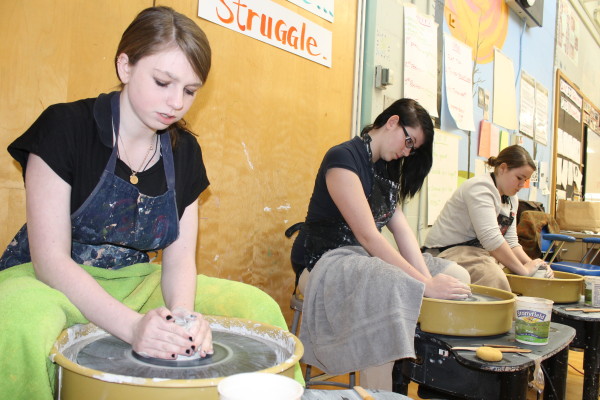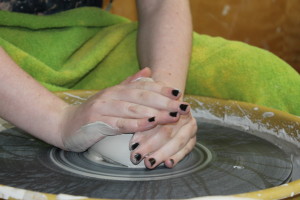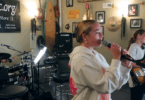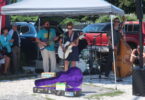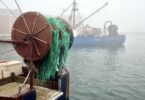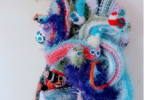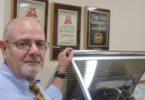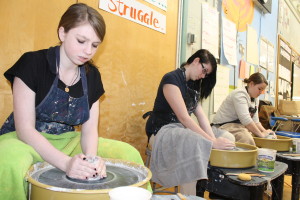
Students in Karyn Phares’s art class at the Lawrence School work on the new pottery wheels at the school.
FALMOUTH – Caitlyn McGhee, an eighth grader at the Lawrence School, was practicing her pottery skills in class Tuesday morning.
But this was not just an art project.
She explained how math plays a role when working in clay on a pottery wheel. “You have to figure out how big to make the wet cup. It shrinks 11.6 percent. You have to do proportions.”
She said science also plays a role in the calculations. “We had to learn about gravity and about the matter in clay and why it shrinks.”
As if to emphasize those connections art teacher Karyn Phares walked over to take a look at her student’s work. “Centrifugal force is not your friend,” Phares said.
“I know,” said Caitlyn with a nod.
Caitlyn was one of three students working on the new pottery wheels this particular morning. All three leaned intently over the pottery wheels, concentrating on spinning lumps of clay. Moving the soft dirt with darkened hands, they worked quietly.
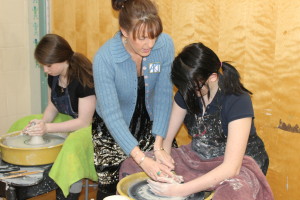
Lawrence School Art Teacher Karyn Phares helps students work on the new pottery wheels in the art department. Phares was awarded a grant by the Falmouth Education Foundation to purchase the wheels.
The pottery wheels, which take up one end of the art room, were purchased through a grant from the Falmouth Education Foundation.
Phares submitted the grant, entitled Full STEAM Ahead, to teach the art of ceramics, along with the science of clay, the engineering of product design, and the mathematics of problem solving.
Phares said the idea behind her grant application was that “Clay is science and math.” She said she is a big proponent of the STEAM curriculum. The STEAM acronym adds Art to the STEM (Science, Technology, Engineering and Math) curriculum that has gained popularity lately in schools throughout the state.
Phares said in researching innovative schools across the country, she learned many districts have already replaced STEM with STEAM.
“Schools on the crest of the education wave are doing STEAM. In my opinion, STEM, without the a, is old news already,” Phares said.
No surprise that an art teacher would be in favor of STEAM rather than STEM, but Phares said there is more to it than just promoting her subject.
“I really believe we should educate the whole brain,” she said. Looking at what the students were learning in their other classes at the junior high, Phares thought ceramics would be a good fit.
“I wanted to make meaningful connections with science and math in art class. [By working with clay], they are not just learning a formula, they have to apply it. They have to figure out how much the cup should weight depending on the shrinkage of the clay,” she said.
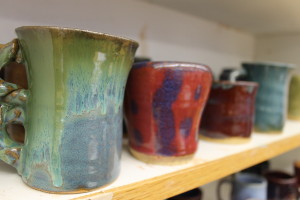
200 cups will be for sale as part of Cups for Life, a fundraiser that uses mugs made with the new pottery wheels at the Lawrence School.
Phares asked one of the high school math teachers to tutor her over the summer so she would be up to speed on her math and science skills before incorporating the concepts into her class.
Work in clay lends itself particularly well to science, she said. From the composition of clay to how centrifugal force affects it on the wheel to what happens to the pot when it cooks in the kiln, she makes the case that knowledge of scientific concepts are essential to crafting a good clay mug.
But Phares also felt clay would be a good fit with the art curriculum at the junior high.
“I thought it would be great for kids to work with a three-dimensional medium. . . .It’s such a great way of engaging the student. They love working with their hands,” she said.
The education foundation prefers grants that emphasize the curriculum in unique inter-departmental ways.
“We love collaboration,” said Sally Hauck, who is vice president of the Falmouth Education Foundation and chairman of the foundation’s Program Committee, which makes the decisions about the grants.
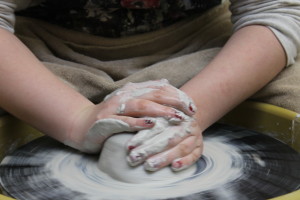
Students practice their clay skills on the new pottery wheels paid for with a grant from the Falmouth Education Foundation.
The $8,500 grant that purchased the pottery wheels and other equipment and supplies for the clay program at the junior high school was one of the larger grants the Falmouth Education Foundation gave out last year.
According to Hauck, the foundation committee reviewed 23 proposals totaling $124,000 and approved 17 proposals totaling $69,000. They did not fully fund every grant request, including Phares’s request. She wanted twice as many wheels so all of her students could work on clay at the same time.
Hauck explained the process the program committee uses to make decisions, which involves individual investigation of the grants and then a long committee meeting to go through all the requests.
“We’re very thoughtful and careful. We don’t give money just to give money. We really want to know they’re good projects. If it doesn’t have the curriculum piece, we don’t do it,” she said.
The next round of grant requests are due April 1.
In these times of severe budget cuts for the Falmouth Public Schools, Hauck said the work of the Falmouth Education Foundation is more important than ever. (At an informational meeting last night at the high school, parents and teachers concerned about the proposed cuts talked of starting a petition for a tax override for the schools.)
In the classroom, Phares watched the students closely as they worked on the pottery wheels, making sure they remembered the basics she had taught them.
“Body position is everything,” Phares said. “The brick and the pedal must be directly underneath the knees. If it’s like you are riding the back of a motorcycle, it’s no good. The pedal and the brick have to be even. The elbows have to be planted. Your face should be directly over your work.”
The students all stopped spinning the wheel and adjusted themselves accordingly.
Phares reminded the students to keep the clay moist. “Water is your friend,” she said.
Caitlyn dabbed her hand in the nearby coffee can filled with water, adding more to the clay.
She smiled as she started up the wheel’s motor. “Omigod, I love this. It’s like my in school therapy,” she said. “It’s really, like, calming, sitting here with your clay and you don’t have to worry about people or school.”
Nichole Cunningham, working at a pottery wheel nearby, agreed. “Yes, I love this. It’s a fun way to learn science and math,” she said.
In February, the students will turn their clay work into a service learning project called Cup of Life, a fundraiser to showcase the work they have done and to raise money for Cape Cod Center for Women, which helps victims of domestic violence. Tickets for Cup of Life are $8. The event is February 10 from 6 to 8 PM in the Lawrence School cafeteria. Tickets are $8.
The Falmouth Education Foundation Annual Winter Gala and Auction is March 1 at the Coonamessett Inn. This year the event honors Carol Chittenden of Eight Cousins Books and Liam and Deborah Maguire.
– Laura M. Reckford

